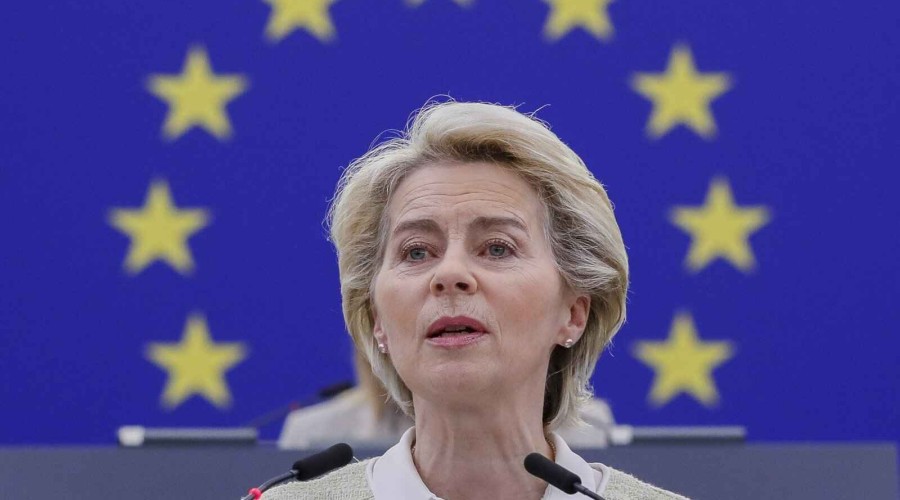EU chief urges ban on Russian oil imports in new set of sanctions
Hungary and Slovakia have already said they wouldn't take part in any oil sanctions

The European Union's top official proposed Wednesday a phased oil embargo on Russia in a sixth package of sanctions targeting Moscow for the ongoing war in Ukraine, sanctioning Russia's top bank in a bid to deepen Moscow's isolation, Qazet.az reports.
The plan, if agreed by EU governments, would mark a watershed for the world's largest trading bloc, which is dependent on Russian energy and must find alternative supplies. But Russia's invasion of Ukraine by land, sea and air on Feb. 24, the renewed Russian offensive in eastern Ukraine and the horrific images of slaughter in Ukrainian towns have overcome reluctance to deliver the toughest sanctions so far.
Von der Leyen, addressing the European Parliament in Strasbourg, France, called on the EU's member nations to phase out imports of crude oil within six months and refined products by the end of the year.
"Today, we will propose to ban all Russian oil from Europe," said von der Leyen.
"We will make sure that we phase out Russian oil in an orderly fashion, in a way that allows us and our partners to secure alternative supply routes and minimizes the impact on global markets,” she added.
"This will be a complete import ban on all Russia," she said to applause in the chamber.
The commission's measures include phasing out supplies of Russian crude oil within six months and refined products by the end of 2022, von der Leyen said. She pledged to minimise the impact on European economies.
The price of Brent crude rose 2% to $107.11 at around 9 a.m. CET (7 a.m. GMT), up 37.5% since the start of year.
"We are addressing our dependency on Russian oil. And let's be clear, it will not be easy because some member states are strongly dependent on Russian oil, but we simply have to do it," she said.
"(Russian President Vladimir) Putin must pay a price, a high price, for his brutal aggression," she said.
European Commission President also proposed that Sberbank, Russia’s largest bank, and two other major banks be disconnected from the SWIFT international banking payment system.
"We de-SWIFT Sberbank – by far Russia's largest bank, and two other major banks. By that, we hit banks that are systemically critical to the Russian financial system and Putin's ability to wage destruction," von der Leyen said.
"This will solidify the complete isolation of the Russian financial sector from the global system," she said.
Von der Leyen said the aim is that "we de-SWIFT Sberbank." SWIFT is the major global system for financial transfers. She also said Sberbank holds around 37% of the Russian banking sector.
Von der Leyen added that those alleged to be spreading disinformation about the war in Ukraine would be targeted.
"We are banning three big Russian state-owned broadcasters from our airwaves. They will not be allowed to distribute their content anymore in the EU, in whatever shape or form be it on cable, via satellite, on the internet or via smartphone apps.”
She didn't name the broadcasters directly, but branded the television channels "as mouthpieces that amplify Putin´s lies and propaganda aggressively. We should not give them a stage anymore to spread these lies.”
Von der Leyen said more high-ranking Russian military officials would face EU asset freezes and travel bans, without giving names. "You are not getting away with this," she said, referring to the Kremlin.
"This sends another important signal to all perpetrators of the Kremlin’s war: We know who you are. We will hold you accountable," von der Leyen told the lawmakers.
The proposals by the commission now need to go to the 27 member states for approval. Diplomats said there was likely to be a longer period granted to Hungary and Slovakia to stop oil imports as they are so heavily dependent on Russian energy.
Simone Tagliapietra of the Bruegel think tank said the EU's gradual embargo on Russian oil was "a risky bet"
"In the short term it might leave Russian revenues high while implying negative consequences for the EU and global economy in terms of higher prices," he said. "Not to talk about retaliation risks on natural gas supplies."
